10th FIMSA ADVANCED IMMUNOLOGY TRAINING COURSE, Tangalooma Island, Queensland, Australia, December 3 -6, 2009
Organizer: The local organizing committee who designed the course, invited the Faculty and chose the venue, was headed by Dr Simon Apte with major help from Dr Denise Doolan and Dr Stephanie Yerkovich. Dr Nicholas King, president of FIMSA was the chair of the meeting and the link to IUIS.
The course was under the auspices of the Australasian Society for Immunology (ASI) and FIMSA, with additional sponsorship from IUIS for travelling awards. The course was held just prior to the 2009 ASI meeting and associated workshops and most course participants also attended the ASI meeting.
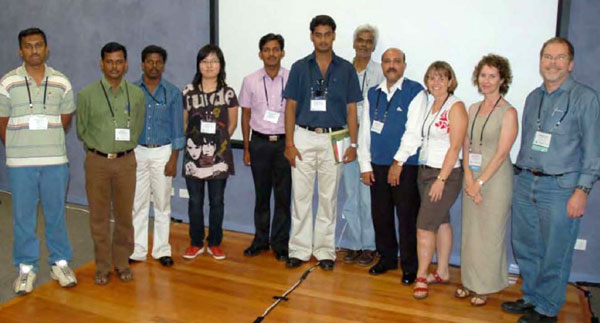
The broad objectives of the course were in keeping with FIMSA and ASI mandates, namely: to encourage and support Immunology in the Australasian region and conduct educational programmes and training courses, and to promote exchange of scientists for the advancement of Immunology in the region. The objective was to create a course where postgraduate and early career researchers could gain a broad exposure to fundamental and advanced concepts in Immunology. Faculty were asked to give a presentatiion that was akin to a generalised lecture rather than a specific data presentation. Attendees experienced informative and cutting-edge talks from 22 of the international leaders in the field, participated in interactive sessions with faculty and gained exposure to technical expertise and demonstration of state of the art equipment.
Tangalooma Island Resort, 60km from Brisbane was a great location for this course and all participants really enjoyed the course and the venue. Facilities, accommodation and activities were judged excellent.
The four recipients of the IUS travelling scholarships were:
Akram Husain Syed, Anand Kasirajan and Arun Prakash Kuduva Jeyachandran from the American College, Madurai, Tamil Nadu, India, and Pradip Saha from the All India Institute of Medical Sciences, New Delhi, India.
THE 6th SUMMER SCHOOL ON IMMUNOLOGY AND IMMUNOGENETICS, New Delhi, India, November 16 – 19, 2009
The summer school coinciding with the ASEATTA 2009 international conference (Nov 12-15, 2009). The course chairman was Prof Narinder Mehra with help from Dr Gurvinder Kaur who acted as the organizing Secretary. It was specially designed to expose young researchers and students to special facets of basic and advanced immunology with particular focus on Histocompatibilty and Clinical Immunogenetics. The school was attended by 52 students representing 11 countries. While most of the students were from various states of India, others came from Australia (3), Canada (1), Germany (1), Holland (1), Germany (1), Iran (1), Ireland (1), New Zealand (1), Romania (1), Saudi Arabia (1) and Sudan (1). Participants from Australia and New Zealand were sponsored by the ASEATTA (Australasian and South East Asian Tissue Typing Association). The selection of the participants was made strictly on the basis of their current activities and research acumen in the field of Immunology.
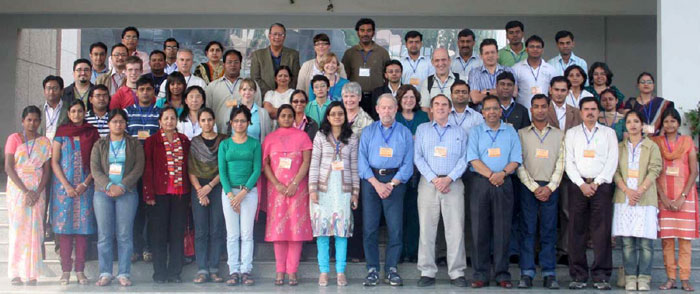
The course format included basic lectures and tutorials delivered by the eminent teaching faculty covering various aspects of Basic Immunology, Transplant Immunology and Immunogenetics. This included lectures on antigen presentation, cytokines, functional lymphocyte subsets, genetic architecture of human MHC, HLA and disease associations with focus on autoimmune and infectious diseases, MHC restriction, role of HLA and antibody determination in organ and bone marrow transplantation and others. The morning sessions included two to three lectures by the teaching faculty and presentations from the students. Afternoon sessions were devoted to group discussions, problem based learning and interactive tutorials.
The highlight of the course were the special sessions on student-faculty interaction and presentation of research projects by the students and discussion thereof. The best three presentations were given certificates of Merit and some cash incentive. The faculty came from the Indian Immunology Society (IIS), Australasian and South East Asian Tissue Typing Association (ASEATTA), American Society of Histocompatibility and Immunogenetics (ASHI) and the European Federation of Immunological Societies (EFIS). The faculty included Abul Abbas (USA), James McCluskey (Australia), Frank Christiansen (Australia), Campbell Witt (Australia), Frans Claas (Holland), Derek Middleton (UK), Carol Pancoska (USA), Deborah Crowe (USA), Malcolm Simons (Australia), Moh Daha (Netherlands), Raja Rajalingam (USA), Narinder Mehra (India) and Gurvinder Kaur (India).
The Summer School was organized at IDSA-Residency Hostels, New Delhi. It was a ‘Residence Course’ where all faculty and course participants stayed together in the same hotel and thus had ample opportunity of consultant-student interaction and scientific exchanges. This arrangement was much appreciated. The course Faculty was extremely supportive and agreed to our request to remain available for the duration of the course.
The course was held immediately following the ASEATTA 2009 conference (Nov 12-15) and hence several of the visiting speakers were requested to stay back for a few additional days. ASEATTA sponsored two teachers and provided bursary support for a few participants. Similarly ASHI and EFIS sponsored the travel and accommodation of two professors each. The local Faculty and most participants from within India were supported through generous grants received from the Indian Council of Medical Research (ICMR), the Council of Scientific and Industrial Research (CSIR) and the Indian Immunology Society (IIS). Only a minimal course fee of US$100 was charged from the participants. The organizers covered all expenses incurred towards hotel stay for 4 -5 nights, all meals during the course, local transportation, dinners and course material and others.
The Education Committee of IUIS kindly provided a grant of USD 5000 towards the course. This was used exclusively for providing bursaries for accommodation and travel of the selected participants from within India and those coming from abroad. They were: Katie Butler, Michael Le Page, Shimony Mohanty from Australia, Aiwen Zhang from Canada, Ramya Nandakumar from Germany, Abhishweta, Anupam Dutta and Archana Singh from India.
E-TRAINING WORKSHOP ON MUCOSAL IMMUNITY AND VACCINE DEVELOPMENT,
Fayoum University Teaching Hospital, Faculty of Medicine, Fayoum – Egypt, November 6-7, 2009
Organized by: Prof. Jean-Pierre Kraehenbuhl, Executive Director, HSeT Foundation, Lausanne; Prof. Farag Ibrahim, Head of Allergy Unit International Medical Centre; Prof Ahmed El-Gohary, President of Fayoum University.
The workshop blended web-based learning through interactive, case-based & face-to-face sessions. The purpose of the workshop is to engage new scientists and investigators interested in the area of mucosal immunity and respiratory infection. Also the goal is to maximize participant learning and foster new developments in influenza vaccine assessment. There were 22 participants from Union of Comoros, Zambia, Soudan, Kenya, Tanzania, Malawi, Eritrea, Rwanda, Mauritius, Burundi, Zimbabwe and Egypt. Students had to review material on line prior to the course. There was a morning of lectures on Mucosal Immunity, Airways immunity & Influenza virus pathogenesis, Basic concepts in vaccinology & influenza vaccines. There was then a review of case assignments and breakout into 3 groups for discussion and preparation of presentations: 1) Study Product: Vaccine and Adjuvant Design; 2) Defining Clinical Trial Immunogenicity Endpoints; 3) Designing a Clinical Trial. This was followed by a 20-minute presentation and a 40-minute discussion by each group and a final wrap up session.
The workshop was judged very interesting by the participants; all enjoyed the E-training experience.
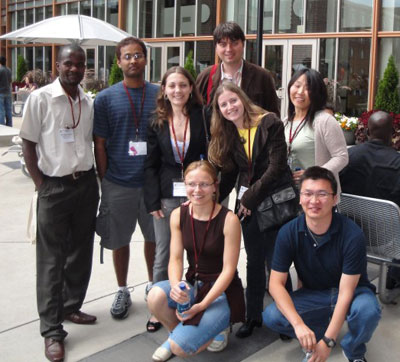 AAI-IUIS Joint Support for 6 Students to Attend the Basic and Advanced Immunology Summer 2009 Courses
AAI-IUIS Joint Support for 6 Students to Attend the Basic and Advanced Immunology Summer 2009 Courses
Following the successful co-sponsorship of five (out of 6 potential) students in 2008, the EducationCommittees of AAI and IUIS agreed to renew the co-sponsorship in summer 2009, and six students benefited. AAI pays for registration and accommodation while IUIS covers the travel expenses, up to $2,000 US. Our committee processed the applications including visa letters and selected the candidates. The AAI approved the applicants and I then informed them. AAI then takes care of the logistics and ensures that the students are well surrounded at the course. We received a total of 16 applicants and funded 6.
All applicants thought that the course was very beneficial and here are their comments:
AAI 2009 INTRODUCTORY COURSE IN IMMUNOLOGY, University of Pennsylvania, Philadelphia, June 19-25, 2009
Dilshan M. Abeysekera, MSc student in Molecular Medicine, Post Graduate Institute of Medicine, University of Colombo, Sri Lanka.
“The course started with a great introduction on the anatomy of the immune system by Dr. Ulrich H. Von Andrian. It certainly caught everyone’s attention and was very interesting with live authentic video clips of his work. Presenting Immune cell behavior in real time was outstanding and made immunology yet more interesting. After the keynote lecture we had some valuable time to spend with people who shared a common interest. Meeting these people was as important as the course content for me. Some were experts in the field, and some were beginners like me. But for all those with Immunology as a language, Dr. Andrian just found new vowels. He certainly raised our expectations for the next following days of the course.
Part I of the course (19th-22nd June) was most important. The lectures were very well organized to brush up on every corner of basic immunology. The solid base created in these few days was indeed helpful to understand the research methodologies. It was very interesting to listen to talented lecturers, who broke apart the complicated research questions using simple basic principles. Part II (22nd -25thJune) went into further details. Since my main area of specialization is molecular diagnostics, I found the topics, Immunity to bacterial infections, transplantation and tumor immunology very interesting. It is simply amazing how two different fields flank each other in some of the most essential applications. Autoimmunity is my personal area of interest. I was able to get a clear glance at the latest research done on this topic. The details gathered will be of immense help to my MSc degree research, which I hope to continue in autoimmune diseases.
I would like to thank Dr. Kira R. Gantt, Diane Kovats, Dr Terri M. Laufer and Dr Michele Hogan of AAI who did their very best and were responsible for my very pleasant stay in Philadelphia. I am grateful to Dr. Michelle Letarte of IUIS, for the great opportunity and also to everyone who helped in any way to make my journey to Philadelphia a success.”
Wipawee Wongchana, MSc student in Biotechnology, Faculty of Science, Chulalongkorn University,Bangkok, Thailand.
“This seminar benefited me not only to understand better basic immunology, but gave me experience in many ways. The professors explained so clearly that I could follow the content comprehensibly although some parts of the lecture were not on my focused topic e.g. mucosal immunology and immunity to infectious diseases. However, many topics especially innate immunity, dendritic cells, cytokines and signaling in the immune system were beneficial and useful for my thesis and area of interest for my future PhD program.
I have learned that the immune system can clear pathogens by nonspecific mechanisms to highly specific recognition, its ability to maintain recognition via memory cells and its function in self tolerance to prevent autoimmune disease. I understood the clonal selection theory, which occurs continuously and independently of pathogen exposure. The cells of immune system are derived from bone marrow progenitors, are continuously produced, survey the body, are activated in the lymphoid organs and become effector cells that can function against specific pathogens.
I learned from this course that when barrier functions fail against certain pathogens, the hematopoetic immune system responds via the innate and adaptive immunity. Innate immunity is characterized by recognition of conservative patterns on pathogens and a rapid response. It has no memory function but can induce inflammation and recruit cells of the adaptive immune responses such as neutrophils, monocytes, macrophages, which kill pathogens and produce important cytokines.
In adaptive immunity, I have learned about T and B cell development including the molecular basis of T and B cell receptors. B cell Ig receptor recognizes conformation of antigens and T cell receptor recognizes peptide in the groove of MHC molecule on B cells, dendritic cells and macrophages which are professional antigen presenting cells. In the section on signaling in the immune system, interaction between molecules and receptors on B cell, T cell and macrophages generate the signals, which involve activation of crucial cells and production of many cytokines such as IL-2.
The signaling through Toll like Receptors (TLRs) in innate immunity and T cell Receptor (TCR) in adaptive immunity is a field of interest, which I plan to further study. I have also learned about dendritic cells which function in presentation of antigen to T cells. I have learned about dendritic cell types and that their life cycle in both human and mice are quite different.
Other than the technical seminars, I also experienced the learning process, making new contacts and new environments outside the class. Even though it was a short period of stay, the experience was valuable and it was very worthwhile to come to the US. I can see for myself, the style of learning immunology at UPenn, which is different from Thailand; that is, the students are more interactive and participate with passion. I hope that the next Thai students can get this good opportunity and support to come to this course and gain valuable experience.”
AAI 2009 Advanced Immunology Course, July 26-31, 2009 University of Minnesota /Minneapolis Campus:
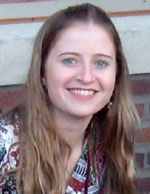 Bárbara Du Rocher D’Aguiar Silva, PhD student in Oncology with emphasis in Tumoral Immunology, National Cancer Institute, Rio de Janeiro, Brazil.
Bárbara Du Rocher D’Aguiar Silva, PhD student in Oncology with emphasis in Tumoral Immunology, National Cancer Institute, Rio de Janeiro, Brazil.
“The opportunity to participate in the AAI Advanced Immunology Course 2009 was an amazing experience that I will remember forever, for my whole life. The experience to get in touch with skillful researchers in the Immunology field, to get in touch with new points of view and also to learn as much as possible about the fascinating world of Immunology was fantastic. What I can say about the course is that it was very interesting and almost all the lectures were very informative. The opportunity to meet people from all part of the world and to exchange cultural information was also very nice. Scientists from Brazil, Africa, Serbia, China, German, India, Israel etc… all together!
I really appreciated the supporting program of AAI and IUIS for people from the developing world. It is avaluable initiative, which gives a possibility to people who are not able to finance this sort of event. Thank you. ”
Tindih Sheltone Heshborne, PhD in Molecular Biology/Immunology, International Livestock Research Institute, Nairobi, Kenya, and Katholieke University of Leuven, Belgium /Prince Leopold institutes of tropical Medicine, Antwerp Belgium.
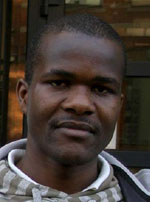 “I take this opportunity to convey my appreciation to IUIS and AAI for giving me an opportunity to attend the summer Advanced Course on Immunology organized at the University of Minnesota. I have been involved in a PhD research study that compares virulence between two isolates of the Theileria parva protozoan parasite. Our findings confirmed that the two isolates differed in the infectivity of bovine lymphocytes. One isolate does not infect and transform CD4+ and γδT cells whereas the second isolate infects and transforms T and B cells.
“I take this opportunity to convey my appreciation to IUIS and AAI for giving me an opportunity to attend the summer Advanced Course on Immunology organized at the University of Minnesota. I have been involved in a PhD research study that compares virulence between two isolates of the Theileria parva protozoan parasite. Our findings confirmed that the two isolates differed in the infectivity of bovine lymphocytes. One isolate does not infect and transform CD4+ and γδT cells whereas the second isolate infects and transforms T and B cells.
Thus my interests at the course were to learn more on the development, differentiation and maturation of T and B cells including the differential expression of surface markers during and after infectivity. Since the parasite also transforms the cells to acquire a tumor like activity, I was interested to learn more on the tumor immunology.
I was impressed by the course because I gained a lot of insights into T and B cell development, signaling andmaturation, which improved my thinking on the research topic. Now that I am at the end of my PhD study, I believe the knowledge gained will help in furthering my career in immunology in addition to helping me in writing my research findings. The course also gave me an opportunity of interacting with different scientist in the US and thus broadening my contact network. Thank you.”
 Andreia Latorre, PhD in the Comparative and Experimental Pathology Program, Department of Pathology, Faculty of Veterinary Medicine and Animal Sciences, University of São Paulo, Brazil.
Andreia Latorre, PhD in the Comparative and Experimental Pathology Program, Department of Pathology, Faculty of Veterinary Medicine and Animal Sciences, University of São Paulo, Brazil.
“I appreciated the opportunity to attend the Advanced Course in Immunology because I reviewed some important issues and learned several topics on Immunology. All lectures were very interesting and I can mention that the most important for me were “Integration of Innate and Adaptive Immunity: the DC”; “NK Cells in Innate Immune Defense”, and “Tumor Immunology” since I have studied the effects of a known carcinogenic plant Pteridium aquilinum on natural killer cells and on the induction of cellular immune response. So, I want to thank the International Union of Immunological Societies and American Association of Immunologists for giving me the chance to participate in such a wonderful course.”
Vladislav Volarevic, MD, PhD Student, Department of Microbiology and Immunology, School ofMedicine, Kragujevac, Serbia.
 “I would like to thank you for giving me the opportunity to attend the AAI Advanced Course. The AAI Advanced Course was perfectly organized. All instructors were very well prepared for sessions. Prof. Gwendalyn Randolph, that presented the newest advances in the field of innate immunity and Dendritic Cells and Prof. Wayne Yokoyama that presented NK Cells in Innate immunity, were outstanding. I was also very delighted with lectures about B Cell Tolerance and Autoimmunity given by Prof. Mark Shlomchik and Immune response to pathogens, by Prof. Christopher Hunter. I had the opportunity to learn the newest advances in different fields of Immunology, particularly in Tumor Immunology and Autoimmune Diseases that I am very interested in. The schedule of the Course was very well organized and there was plenty of time for me to ask questions and to discuss the presented topics with instructors and with other participants. I am very satisfied because I had the opportunity to meet prestigious American Immunologists and to exchange information with them, and to meet a lot of young very perspective immunologists from all parts of the world. I met very nice people and I made friends with Sebastian Ortega from Dallas, Kit Wong from Honk Kong, Nyambayar Dashtsoodol from Japan, Kasia Wejksza and Enka Malchinkhuu from Baltimore, Patricia Kehn from Washington D.C., Barbara Durocher and Andrea Lattore from Brazil, Tindih from Kenya and Naresha from Vermont.
“I would like to thank you for giving me the opportunity to attend the AAI Advanced Course. The AAI Advanced Course was perfectly organized. All instructors were very well prepared for sessions. Prof. Gwendalyn Randolph, that presented the newest advances in the field of innate immunity and Dendritic Cells and Prof. Wayne Yokoyama that presented NK Cells in Innate immunity, were outstanding. I was also very delighted with lectures about B Cell Tolerance and Autoimmunity given by Prof. Mark Shlomchik and Immune response to pathogens, by Prof. Christopher Hunter. I had the opportunity to learn the newest advances in different fields of Immunology, particularly in Tumor Immunology and Autoimmune Diseases that I am very interested in. The schedule of the Course was very well organized and there was plenty of time for me to ask questions and to discuss the presented topics with instructors and with other participants. I am very satisfied because I had the opportunity to meet prestigious American Immunologists and to exchange information with them, and to meet a lot of young very perspective immunologists from all parts of the world. I met very nice people and I made friends with Sebastian Ortega from Dallas, Kit Wong from Honk Kong, Nyambayar Dashtsoodol from Japan, Kasia Wejksza and Enka Malchinkhuu from Baltimore, Patricia Kehn from Washington D.C., Barbara Durocher and Andrea Lattore from Brazil, Tindih from Kenya and Naresha from Vermont.
The few hours of free time that I had, I spent with my new friends and visited downtown Minneapolis and the beautiful countryside of Minnesota. The Radisson University Hotel on the Campus of University of Minnesota was excellent. It was only 5 minutes by foot from The Coffman Theatre and Mayo Theatre where the AAI Advanced Course lectures were held. In conclusion, I am extremely satisfied with AAI Advanced Course because I met great people: instructors, professors, scientists, young researchers and I learnt a lot of new approaches in Immunology. Now, I am going to transfer this knowledge by teaching the students in Serbia. Regards and thank you, once more!”
Cancer Immunotherapy and Immunomonitoring (CITIM), Kiev, Ukraine, May 18-21, 2009
Organizers: M.Shurin and A. Hurwitz, co-sponsored by AAI.
This International research/clinical/educational conference was held at the Great Conference Hallof the National Academy of Sciences of Ukraine in Kiev. The purpose of the CITIM meeting was to foster exchange of the most recent findings and ideas in tumor immunology and immunotherapy and provide specific educational activities for Ukrainian and Easter European basic and clinical immunologists. The CITIM meeting also provided an environment to stimulate scientific discussions of novel clinical diagnostic and therapeutic approaches. By providing Best Abstract, Travel and Clinical Scientist Awards, CITIM meeting specifically supported creativity and novelty in order to inspire a strong basic research portfolio and achieve the rapid translation of insights from research laboratories to the bedside. The slogan of the CITIM meeting was “REDEFINING CANCER THERAPY” by:
1) Promoting basic and clinical research in tumor immunology;
2) Disseminating information and encouraging international collaborations in immunology;
3) Identifying ways to improve the quality of immunological research and clinical care;
4) Encouraging and providing training and continuous education in immunology.
The main topics of the meeting were: Regulatory and effector mechanisms in cancer; Tumormicroenvironment and cancer immunotherapy; Cancer immunotherapy: Problems and Perspectives; Cancer immunotherapy: New approaches; Immunomonitoring in cancer clinical trials.
This 1st International Conference “Cancer Immunotherapy and Immunomonitoring (CITIM)” wasthe first meeting in Eastern Europe to specifically focus on the issue of immune regulation in the tumor environment, cancer immunotherapy, and immunomonitoring of immunotherapeutic clinical trials. This CITIM Conference held in Kiev, Ukraine, was comprised of eight plenary sessions and two special selected poster presentation sessions. Selected contributions from the participants of the Conference are published in the Journal of Immunotoxicology. Anatoli Malyguine, Victor Umansky and Michael R. Shurin, Cancer Immunotherapy and Immunomonitoring: Redefining Cancer Therapy.
Seven graduate students from Italy, Germany, Czech Republic, Hungary, Spain, the Netherlands,Portugal won travel awards and gave presentations, as well as 3 selected students from Ukraine.
IMMUNOMODULATION 2009, “Organization of Converging Pathways”, Buenos Aires, ARGENTINA
The course was held on Tuesdays from 19:00-21:00, from May to July 2009, organized by immunologists from Argentina, at the Argentinian Catholic University (UCA) in Buenos Aires. Main organizer: Tomás Herrero.
The course was aimed for advanced students in medicine, general practitioners, paediatricians,immunologists and related specialities, investigators, biochemists, endocrinologists, neurologists, and interested members from the scientific community. The main objective of the course was to offer a comprehensive view in differents areas of clinical immunology. The complexity of areas such as autoimmunity, oncology, immunonutrition, and allergy, were approached with a new diagnostic focus and immunomodulation from molecular profile to the clinic. Finally, linking immunology, endocrinology, and neuroscience, with a recent perspective on neuroimmunoendocrinology.
The Immunology Course in Buenos Aires has been a success. There was very good attendance, no lessthan 38 students at the Course. The teaching staff were committed with their participation in various lectures. Also, the students received various prints and CDs with the lecture’s contents and, in general, fellows and students were very satisfied with the course. In this regard, I annex a student opinion about it.
Here are the comments of one of the students:
“Dear Dr. Herrero: My name is Carlos Modenutti and I recently graduated in Genetics at the National University of Misiones. From April 1st, I am working in Buenos Aires at the Immunology Department, Faculty of Pharmacy and Biochemistry, IDEHU, a CONICET-UBA Institute. I am starting with my PhD project on “Modulation of the immune response by extracellular matrix components (Hyaluronan) Activation of signalling pathways in leukemic cell lines”, directed by Prof. Silvia E. Hajos. I would like very much to participate in the Course you are directing since it will be very useful for my training in Immunology and my future work. Thank you very much for the support from IUIS for the course. I have enriched my knowledge of immunology with this excellent Course in Buenos Aires. Its overall contents were good in terms of its complexity and the particular topic. In relation to teaching, an aspect that could be improved is the summary provided by the speakers. I believe that the format of the summary for all the speakers should be standardized, as the quality of information and the extension of the summaries was heterogeneous. Finally, I think that it would be suitable to include more current immunologic topics in the next Course.”
FOCIS 2009 Advanced Course in Basic and Clinical Immunology, Scottsdale, Arizona, USA, February 18-22, 2009.
Co-sponsoring 3 students to attend this course. This was an initiative of Dr Olivera Finn, while president of AAI. Dr Andrew H. Lichtman, and Dr Abul Abbas, course leaders and the FOCIS board of directors, supported the initiative and provided registration, hotel and partial board while IUIS provided the travel, up to $2,000 US. Our committee selected the candidates. We hope to renew this co-sponsorship for 2010.
The course is aimed at academic physicians, postdoctoral clinical fellows and trainees doing basic research with an emphasis on human disease. Prominent speakers lecture on topics in cellular and molecular immunology, including innate immunity, B cells, T cells and cytokines. Special sessions cover new advances in clinical immunology and the molecular and genetic basis of immune-mediated diseases. There are many opportunities for the attendees to discuss areas of particular interest with faculty and participants. The course provides a syllabus, course book and access to online lecture materials.
Here are the comments for the 3 students who participated in the FOCIS course:
 Anira Fernando, Genetech Research Institute, Sri Lanka
Anira Fernando, Genetech Research Institute, Sri Lanka
“The line up of speakers for The Advanced Course in Basic and Clinical Immunology, promised a very informative and educative course, and it proved to be just that. The course began with a reception where we were able to spend time getting to know other participants as well as some of the speakers. Throughout the three days of the course we had lectures on important topics in cellular and molecular biology, including innate and adaptive immunity, T cells, B cells and the host of other components involved in immune defence.
My previous studies have involved work on the innate immune system and while the course helped me enhance my knowledge on innate immunity it gave me a whole breadth of knowledge on all the components of the immune system as well as invaluable insight into immunological diseases, new advances in clinical immunology and current immunotherapeutic modalities.
On the whole the course gave me a much wider understanding of the field of immunology and gave me a better idea of which particular area of immunology I would like to work on to pursue my PhD. The highlight of the course for me was being able to interact with the speakers on the course and particularly Dr. Shiv Pillai’s performances where he so effortlessly turned immunological theory into rhyme. It was indeed a very rewarding course. I now look forward to continuing my research, equipped with the knowledge I have gained during the course and contributing to strengthen the field of immunology within Sri Lanka.”
Julieta Genre, PhD student, Biomedical Science Institute
IV, University of São Paulo, São Paulo, Brazil
“Participating in the Advanced Course in Basic & Clinical Immunology was one of the most incredible experiences I have ever had and allowed me to advance my skills in clinical immunology and to broaden my depth of knowledge about diverse aspects of basic immunology.
 The course sessions covered all the major topics in cellular and molecular immunology and the invitedspeakers were highly qualified. Without exception, all the presentations were really instructive and the speakers were open for questions and comments during the whole event, giving me the opportunity to discuss with them particular aspects of my research. The course also offered me the great opportunity to interact with clinical fellows and scientists from the biotechnology and pharmaceutical field from all over the world.
The course sessions covered all the major topics in cellular and molecular immunology and the invitedspeakers were highly qualified. Without exception, all the presentations were really instructive and the speakers were open for questions and comments during the whole event, giving me the opportunity to discuss with them particular aspects of my research. The course also offered me the great opportunity to interact with clinical fellows and scientists from the biotechnology and pharmaceutical field from all over the world.
By the end of the course, I strongly felt that I improved my understanding of the fundamental mechanisms underlying immunologic diseases and the development and application of strategies for therapeutic modulation of the immune system. The course was a brainstorm of ideas and I am confident that I will be able to make significant changes regarding the focus of my research, interpretation and discussion of the results.
Attending the course was an amazing experience and I will personally recommend it. I sincerely wish that all the students in the immunological field had the opportunity that was given to me and I am encouraging FOCIS to continue giving support for students from developing countries to attend this extraordinary course. I would like to thank the IUIS Educational Committee and FOCIS for giving me this excellent opportunity to learn.”
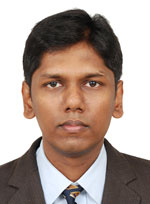 Mayil Vahanan, PhD student, Department of Molecular Oncology, Cancer Institute (WIA), Chennai, India
Mayil Vahanan, PhD student, Department of Molecular Oncology, Cancer Institute (WIA), Chennai, India
“I am really grateful to IUIS Education Committee and FOCIS for giving me the opportunity to participate in the course. The course was well organized starting from the Basics in Innate immunity to the final lecture, New and Emerging Immune Therapies. Throughout my undergraduate and postgraduate studies, I really wondered about the cascade of molecular events behind every Immunological reaction. As a participant in the course, I am glad that I had the first hand information about these molecular interactions through the course directors and other faculty members.
Apart from the knowledge gained through the course, I had an opportunity to exchange my understandings andideas with the fellow participants. I believe this International exposure will definitely help me to carve my own niche and fulfill my research desire to become a reality. ”
1st São Paulo Immunology Graduate Course, BRAZIL, February 16-20, 2009
 A three day graduate course was followed by a one day Symposium: “Research Advances and Progress in Immunology”, organized by The Department of Immunology of the Institute of Biomedical Sciences of the University of São Paulo is for Latin American graduate students. Teachers are immunologists from Brazil and around the world.
A three day graduate course was followed by a one day Symposium: “Research Advances and Progress in Immunology”, organized by The Department of Immunology of the Institute of Biomedical Sciences of the University of São Paulo is for Latin American graduate students. Teachers are immunologists from Brazil and around the world.
Organizing Committee: Drs Lourdes Isaac, Luiz Vicente Rizzo, Momtchilo Russo, Departamento de Imunologia, Instituto de Ciências Biomédicas, Universidade de São Paulo, Brasil; Dr. Mohamed R. Daha, Department of Nephrology, Leiden University Medical Center, Leiden, Netherlands.
A total of 35 students from Argentina, Paraguay, Peru and Brazil participated in all lectures and discussion of selected papers. For the Symposium, nearly 300 participants were registered, including the students enrolled in the course. Despite the fact that Brazil is a large country and South America is a large continent, Latin America is often isolated from the most influential academic centers. For this reason, this event represented a very important opportunity to bring leaders from several fields in Immunology to interact with our community and dedicate a lot of time and effort to teach our students.
Participation from 6 invited immunologists: three from overseas – Drs Mohamed R. Daha, Sergio Lira and Ruslan Medzhitov – and three from Brazil – Drs. Momtchilo Russo, Luiz Vicente Rizzo and José Alexandre Marzagão Barbuto. Each professor gave a 90-minute Master-Class, which was followed by intensive study sessions where important papers were discussed. Of equal importance was the unique opportunity for the students to interact with the lecturers.
The following topics were presented in the graduate course: Overview of the Innate Immunity, Complement System, Chemokines and leukocyte trafficking, Toll-like receptors in Inflammation, Dendritic cells. The symposium addressed: Mechanisms of Innate Recognition, Toll like receptors in Asthma, Deregulation of Complement Activation and Its Consequences for Disease, Mechanisms underlying the formation of tertiary lymphoid tissue, Dendritic cells and Immunotherapy of Cancer Patients, Immunodeficiencies: Past and Future Progress.

